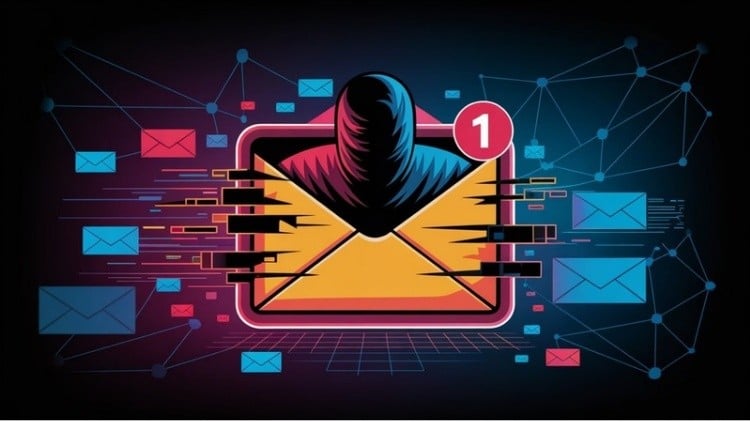
Learn to detect phishing emails, avoid spam, and secure your inbox using real-world tactics and easy step-by-step method
⏱️ Length: 5.8 total hours
⭐ 4.67/5 rating
👥 3,656 students
🔄 April 2025 update
Add-On Information:
Note➛ Make sure your 𝐔𝐝𝐞𝐦𝐲 cart has only this course you're going to enroll it now, Remove all other courses from the 𝐔𝐝𝐞𝐦𝐲 cart before Enrolling!
-
Course Overview
- This masterclass offers a critical and timely intervention into the ever-present threat landscape of email-borne attacks. Designed for the 2025 digital environment, it directly addresses the escalating sophistication of phishing attempts and pervasive spam, providing learners with immediately actionable strategies.
- Moving beyond theoretical definitions, this course is meticulously structured to deliver a “live” and dynamic learning experience, focusing on practical identification and swift mitigation techniques. It emphasizes developing a sharp, discerning eye to differentiate legitimate communications from deceptive traps.
- In a concise 5.8 hours, participants will acquire a robust framework for inbox defense, transforming from passive email users into proactive cybersecurity assets. The curriculum prioritizes real-world application, ensuring that every concept learned can be applied the moment you return to your inbox.
- Understand the psychological manipulation behind social engineering tactics deployed in malicious emails, enabling you to preemptively identify and neutralize threats before they can compromise your data or digital identity.
- Equip yourself with the mental models and analytical processes required to stay ahead of evolving threat vectors, ensuring your email security posture remains resilient throughout the year 2025 and beyond.
-
Requirements / Prerequisites
- Basic Computer Literacy: A fundamental understanding of operating a computer, navigating the internet, and using web browsers.
- Active Email Account: Access to a personal or work email account for observation and practical application of detection techniques discussed throughout the course.
- Internet Connection: A stable internet connection is essential to access course materials, participate in discussions, and view demonstration content.
- Eagerness to Learn: A strong desire to enhance personal cybersecurity knowledge and protect digital assets from prevalent email threats.
- No Prior Cybersecurity Expertise Required: This course is structured to be accessible to beginners while providing valuable insights even for those with some existing technical knowledge, focusing on user-centric detection.
-
Skills Covered / Tools Used
- Advanced Threat Recognition: Develop an acute ability to identify subtle indicators of compromise within email content, links, and attachments that bypass conventional antivirus solutions.
- Critical Link Analysis: Master techniques for scrutinizing URLs embedded in emails without clicking them, recognizing disguised or malicious redirection attempts.
- Payload Disarming Strategies: Learn how to safely handle suspicious attachments, understanding the common file types used in malware delivery and methods to verify their integrity without execution.
- Social Engineering Countermeasures: Gain insight into the psychological ploys used by attackers and learn to recognize urgency, authority, scarcity, and familiarity cues designed to bypass rational thought processes.
- Impersonation Detection: Acquire skills to spot sophisticated email impersonation attempts, distinguishing genuine senders from fraudulent lookalikes often leveraging subtle domain variations or display name spoofing.
- Secure Reporting Protocols: Understand the best practices for reporting suspicious emails to IT departments, email providers, or relevant authorities, contributing to broader threat intelligence efforts.
- Proactive Inbox Hygiene: Implement daily routines and configuration adjustments to minimize the influx of spam and reduce exposure to potential phishing campaigns.
- Intuitive Header Interpretation (User Perspective): Gain a practical grasp of key email header fields like “Return-Path,” “Received,” and “Message-ID” to identify anomalies indicative of spoofing, without needing deep technical system administration knowledge.
- Leveraging Browser Security Features: Understand how modern web browsers and email clients offer built-in protections and how to maximize their effectiveness in your defense strategy.
-
Benefits / Outcomes
- Fortified Personal and Professional Inbox: Achieve a significant reduction in vulnerability to email-borne attacks, safeguarding your personal identity, financial details, and corporate data.
- Enhanced Digital Confidence: Navigate your email communications with greater assurance, free from the constant anxiety of falling victim to scams or data breaches.
- Financial Loss Prevention: Directly mitigate the risk of monetary theft, fraudulent transactions, and ransomware demands often initiated through phishing campaigns.
- Valuable Workplace Asset: Become an educated first line of defense against cyber threats within your organization, contributing to a stronger collective security posture.
- Improved Cyber-Hygiene Habits: Cultivate a disciplined and proactive approach to all digital interactions, extending beyond email to broader online safety.
- Empowered Decision-Making: Develop the ability to make informed, split-second decisions regarding the legitimacy of emails, protecting yourself and potentially others from harm.
- Up-to-Date Threat Awareness: Remain current with the latest phishing tactics and spam techniques, as the course content is updated for the 2025 threat landscape.
-
PROS
- Highly Relevant & Current: Specifically updated for 2025, ensuring strategies are effective against the newest threat evolutions.
- Actionable & Practical: Focuses on real-world tactics that can be immediately applied to secure your inbox.
- Concise & Efficient: Delivers critical knowledge in a manageable 5.8 hours, respecting your time while maximizing learning.
- High Student Satisfaction: A 4.67/5 rating from over 3,600 students attests to its quality and effectiveness.
- Empowers the User: Transforms passive recipients into active defenders against pervasive email threats.
- Beginner-Friendly Approach: Designed with easy step-by-step methods, making complex topics accessible to everyone.
-
CONS
- User-Side Focus: Primarily concentrates on end-user detection and protection, not delving into advanced server-side email security configurations or enterprise-level administrative controls.
Learning Tracks: English,IT & Software,Network & Security
Found It Free? Share It Fast!